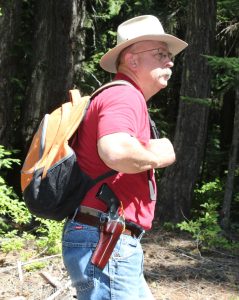
By Dave Workman
Editor-in-Chief
The call for help from a group of mountain bikers who were attacked by a cougar in the foothills east of Seattle, Washington speaks volumes about preparedness and the Evergreen State’s political climate.
The message from released 911 calls was direct: “We need a helicopter on location and we need someone with a gun to kill the cougar. We are right now we have a bicycle on top of the cougar and he’s fighting back.”
A 60-year-old woman, one of a group of five cyclists on the trail at the time, was injured and taken to a Seattle hospital for treatment.
Seattle’s KOMO so far is the only local news agency to report the content of the 911 emergency call which followed the Feb. 17 incident. A “subadult” cougar was shot dead by responding wildlife officers, and a hound handler was unable to locate a second cat that was also spotted. There is conjecture that animal was the dead cougar’s mother.
This was not the first time a mountain biker was attacked by a mountain lion in Washington, coincidentally within a few miles of this most recent incident. In May 2018, a mountain biker was killed in a cougar attack near the North Fork of the Snoqualmie River. That animal was tracked down by wildlife officers and killed later in the day.
The Saturday attack occurred on a popular trail along the Tokul Creek drainage west of where the fatal 2018 incident happened. Tokul Creek is a tributary of the main Snoqualmie River.
Social media postings regarding the attack indicate there may be quite a few mountain lions in the region north of the cities of Snoqualmie and North Bend in east King County. There is a large forest area in this region, which is located in the foothills of the Cascade Mountains.
In 1996, a citizen initiative banning the hunting of cougars with hounds was passed, and since then, the number of big cats has multiplied. In 2022, it was estimated Washington was home to some 3,600 cougars, but many in the hunting community think that is a low estimate.
There is no prohibition on carrying firearms in the wilds of Washington State. In fact, under state law, it is legal in Washington to carry a concealed sidearm without a concealed pistol license for, “Any person engaging in a lawful outdoor recreational activity such as hunting, fishing, camping, hiking, or horseback riding, only if, considering all of the attendant circumstances, including but not limited to whether the person has a valid hunting or fishing license, it is reasonable to conclude that the person is participating in lawful outdoor activities or is traveling to or from a legitimate outdoor recreation area.”



